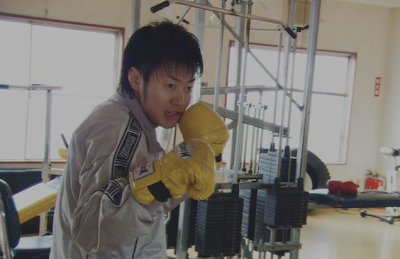
イエローキッド (Ireoo Kiddo)
Released: 2010
Ditrector:
Tetsuya Mariko
Starring:
Kaname Endo
Ryo Iwase
Marie Machida
Kazuki Namioka
Hideki Tamai
Running time: 111 min.
Reviewed by Chris MaGee
"You just haven't earned it yet, baby. You must suffer and cry for a long, long time..." It was that chorus from late 80s Smiths song that kept going through my head as I watched Tetsuya Mariko's 2010ilm "Yellow Kid". That's in no way a slight against the 29-year-old director who shows real promise as a filmmaker. That chorus does, at least for me, capture the mood and predicaments of "Yellow Kids" two main characters perfectly, two men who have hammered away at their dreams while using legendary characters and archetypes as fuel for their fire. It ends up being these two men's own human shortcomings that may stop them from ever equaling up to these lofty examples.
Tamura (Kaname Endo) has wanted to be a professional fighter since he read a manga titled "The Yellow Kid". This manga updates the classic Richard F. Outcalt drawn character Yellow Kid from the late 19th-century comic "Hogan's Alley" and takes the scruffy street urchin into adulthood and a career as a boxer. The image at the end of this manga in which the Yellow Kid stands alone in the center of the ring was what first sent Tamura to the gym. Once there he encounters lightweight champ Mikuni (Kazuki Namioka) and suddenly he has not one but two heroes. The only problem is that Mikuni and the other boxers at the gym are more like petty thugs than heroes. While Tamura must deal with their antagonism the Yellow Kid remains silent. It's hard for a manga character to offer advice or guidance to a troubled young man.
 Meanwhile manga artist Hattori (Ryo Iwase), the man who drew the updated Yellow Kid that Tamura admires so much, is stepping back into the ring to bring a new Yellow Kid adventure to the page. It's obvious that Hattori is just scraping by as a manga artist and his dreams of success are riding on this new comic. At first he wants to base this new Yellow Kid on his boyhood friend Mikuni, but Mikuni's involvement with Hattori's former girlfriend Mana (Mari Machida) complicates this. Ultimately Hattori meets Tamura and makes him his artistic muse, his idealized superhero boxer who takes on the forces of evil in his new manga. But Tamura, an orphan who lives with his senile grandmother and can't hold down a job because of his fiery temper, isn't what you would call a hero. Despite this Hattori begins drawing his manga and Mariko uses ingenious editing and a rich colour palate to combine the comic book world of clearly defined right and wrong with Tamura's bleak and destructive reality.
Meanwhile manga artist Hattori (Ryo Iwase), the man who drew the updated Yellow Kid that Tamura admires so much, is stepping back into the ring to bring a new Yellow Kid adventure to the page. It's obvious that Hattori is just scraping by as a manga artist and his dreams of success are riding on this new comic. At first he wants to base this new Yellow Kid on his boyhood friend Mikuni, but Mikuni's involvement with Hattori's former girlfriend Mana (Mari Machida) complicates this. Ultimately Hattori meets Tamura and makes him his artistic muse, his idealized superhero boxer who takes on the forces of evil in his new manga. But Tamura, an orphan who lives with his senile grandmother and can't hold down a job because of his fiery temper, isn't what you would call a hero. Despite this Hattori begins drawing his manga and Mariko uses ingenious editing and a rich colour palate to combine the comic book world of clearly defined right and wrong with Tamura's bleak and destructive reality.Yes, "Yellow Kid" is definitely an underdog story. This is true not only for Tamura but for Hattori as well; but Tetsuya Mariko, who previously directed segments in the omnibus films "Reckless" and "Lush Life", plays with our expectations of the underdog boxer genre right from the start. Instead of the scrappy street fighter who becomes a star formula that powered the "Rocky" franchise Mariko gives us something more complex. If I must find thematic equivalents to other boxing films I would put "Yellow Kid" in the same camp as Martin Scorsese's "Raging Bull" or Shinya Tsukamoto's "Tokyo Fist". While Mariko's vision isn't as explosive or dark as those two classics "Yellow Kid" shares their themes of what happens to a life that has violence at its center. What happens when it's your fists and not your brains that do the decision-making? Mariko, who also wrote the screenplay for "Yellow Kid", adds an interesting philosophical query to these questions though. What happens when people like Tamura and Hattori create idealized heroes where none exist. Their unrealistic expectations of comic book heroes, retired prize fighters and each other end up creating doomed dreams, hurt feelings, desperation and ultimately ruin for both of them.
"Yellow Kid" combines dark insights into human nature with first rate film craftsmanship. While the characters lives may have had the refrain from The Smiths' song "You just haven't earned it yet, baby," repeating in my head it's obvious that Tetsuya Mariko has earned his title of filmmaker with this debut feature film.


























No comments:
Post a Comment